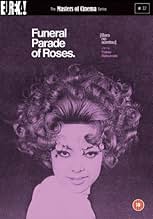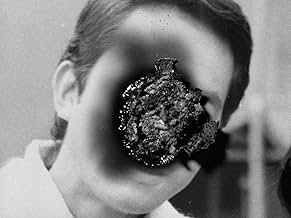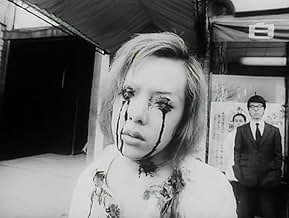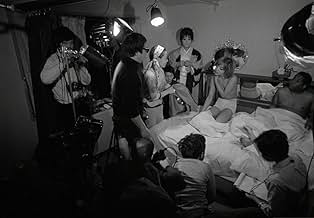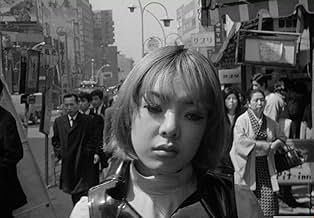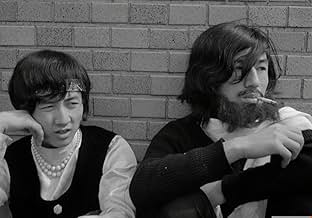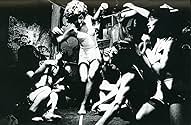- Dirección
- Guionista
- Todo el elenco y el equipo
- Producción, taquilla y más en IMDbPro
Opiniones destacadas
This is a movie that was made in the late '60s, early '70s period of Japan when Japan influenced by the Hippie culture was experimenting with their own brand of Avant Garde culture that was sometimes called "Angura". This is shortened Japanese pronunciation for "Underground". As the word suggests, these were experimental non-mainstream production that explored much about free sex, and anti establishment view of the world.
Gay culture was almost never picked up in Japanese movie up to this point, and it was first public exposure to the literally underground culture of the society at that time. This movie was also the debut for Pita or Shinnosuke Ikehata as Eddie. He has become somewhat of an icon for gay culture in Japan, but this movie was actually the first time he appeared as gay in public, and prior to that, he was only known as a beautiful boy dancer. His father was a natori of Japanese dance school, and he is a trained dancer himself.
Producers of this movie auditioned over 100 candidates, but couldn't find the right talent. Novel writer Tsutomu Minakami told the producers about "this boy" who was a go go dancer at a club in Roppongi. When the producers went to the club, and met the then 16 year old Ikehata, they knew they had the right person. Ikehata had a nick name Pita from Peter Pan, as he was so beautiful, and it was difficult to tell if he was a boy or a girl.
Story is bit convoluted, Eddie, who is the top host at the club Junne has intimate relation with the club's owner Gonda (Yoshio Tsuchiya). When the madam of the club Leda discovers this, he goes into a jealous frenzy, and tries to hurt Eddie. Eddie gets an idea to kill Leda, but that also brought back his suppressed memory of killing his own mother. Leda makes an attempt on Eddie's beauty by trying to cut his face, but fails. Gonda dumps Leda, and Leda commits suicide. But Gonda finds out the real truth about the relation between himself and Eddie.
The production of this movie is above average for avant garde movies made during this period. There's humor, talent, interesting point of view, and a real story. This is one of must see movies to come out of Japan.
Gay culture was almost never picked up in Japanese movie up to this point, and it was first public exposure to the literally underground culture of the society at that time. This movie was also the debut for Pita or Shinnosuke Ikehata as Eddie. He has become somewhat of an icon for gay culture in Japan, but this movie was actually the first time he appeared as gay in public, and prior to that, he was only known as a beautiful boy dancer. His father was a natori of Japanese dance school, and he is a trained dancer himself.
Producers of this movie auditioned over 100 candidates, but couldn't find the right talent. Novel writer Tsutomu Minakami told the producers about "this boy" who was a go go dancer at a club in Roppongi. When the producers went to the club, and met the then 16 year old Ikehata, they knew they had the right person. Ikehata had a nick name Pita from Peter Pan, as he was so beautiful, and it was difficult to tell if he was a boy or a girl.
Story is bit convoluted, Eddie, who is the top host at the club Junne has intimate relation with the club's owner Gonda (Yoshio Tsuchiya). When the madam of the club Leda discovers this, he goes into a jealous frenzy, and tries to hurt Eddie. Eddie gets an idea to kill Leda, but that also brought back his suppressed memory of killing his own mother. Leda makes an attempt on Eddie's beauty by trying to cut his face, but fails. Gonda dumps Leda, and Leda commits suicide. But Gonda finds out the real truth about the relation between himself and Eddie.
The production of this movie is above average for avant garde movies made during this period. There's humor, talent, interesting point of view, and a real story. This is one of must see movies to come out of Japan.
Eddie is a transvestite hostess at one of Tokyo's clubs. He/she spends her time working, being in the films of a friend, taking drugs and trying to find love.
Said to be one of Stanley Kubrick's favorite films and a big influence on Clockwork Orange this is probably one of the best films most people have never seen. Released in 1969 this film is as fresh and shattering as it must have been back when it was made. Set in a "Gay" world this is actually a movie about people and how they act and feel, the fact that they are gay is irrelevant. These are real people in a real world that seems to be happening now instead of when it was made (due no doubt to the stunning black and white photography). The film uses just about every 1960 "art film" technique you can think of and does so better than any film in from Europe ever did (Buñuel, and Bergman should have been this successful). Interviews of the cast, sudden juxtaposition of scenes, shifts in tone and style, sudden bursts of violence, all blend together to tell a story of a search for identity and place that is in its way universal, even if its outcome is not.
This is a movie that is simple to explain, but difficult to sum up. The effect of it being somewhat greater than the simplicity of the storyline.
See this movie. This is one of those movies that movie lovers should search out.
9 out of 10 (Because to be honest I'm not sure if I'm more in love with the technique or the film itself- though either way its a great film)
Said to be one of Stanley Kubrick's favorite films and a big influence on Clockwork Orange this is probably one of the best films most people have never seen. Released in 1969 this film is as fresh and shattering as it must have been back when it was made. Set in a "Gay" world this is actually a movie about people and how they act and feel, the fact that they are gay is irrelevant. These are real people in a real world that seems to be happening now instead of when it was made (due no doubt to the stunning black and white photography). The film uses just about every 1960 "art film" technique you can think of and does so better than any film in from Europe ever did (Buñuel, and Bergman should have been this successful). Interviews of the cast, sudden juxtaposition of scenes, shifts in tone and style, sudden bursts of violence, all blend together to tell a story of a search for identity and place that is in its way universal, even if its outcome is not.
This is a movie that is simple to explain, but difficult to sum up. The effect of it being somewhat greater than the simplicity of the storyline.
See this movie. This is one of those movies that movie lovers should search out.
9 out of 10 (Because to be honest I'm not sure if I'm more in love with the technique or the film itself- though either way its a great film)
In a key moment around the half-way mark in Toshio Matsumoto's Funeral Parade of Roses, the young protagonist Eddie, a transsexual working in Tokyo, stabs his mother's lover and then his mother himself. Matsumoto's film is full of Oedipal subtexts, but here Eddie kills his mother to (perhaps) get to his father, so it is the reverse of the Oedipus story. In fact, most of the film is 'backwards' in the traditional sense, full of narrative tricks, contrasting styles and shifts in tone, moving from melodrama to documentary to horror with each scene.
Eddie (played by real-life queen Pita) is a drag-queen working at a top Tokyo underground club ran by Gonda (Yoshio Tsuchiya). Eddie is the top attraction at the club, much to the envy of ageing madam Leda (Osamu Ogasawara). When Gonda starts a secret affair with Eddie, Leda finds out and plans to hurt and disfigure Eddie in her jealousy. Running alongside this fictional storyline are various interviews with the real-life queens who act in the film, who offer insights about life in Tokyo for queens and how the film will represent them.
There was a huge boom in Japan in the 1960's of films now known as Japanese New Wave. Funeral Parade of Roses is certainly one of the most daring and technically innovative, stripping back genre (and even cinematic) conventions to create one of the most important films in the history of Gay Cinema. This leads to an occasionally confusing and head- spinning film, that can switch quickly from a generic love scene to a moment of avant-garde (an argument between two queens have them shouting at each other with speech bubbles) to a bloody set-piece. One of the most inspirational films to come out of Japan, this was a favourite of Stanley Kubrick's, and no doubt the scenes that are played out in fast- forward were an influence on A Clockwork Orange (1971). Uncompromising, unapologetic cinema.
www.the-wrath-of-blog.blogspot.com
Eddie (played by real-life queen Pita) is a drag-queen working at a top Tokyo underground club ran by Gonda (Yoshio Tsuchiya). Eddie is the top attraction at the club, much to the envy of ageing madam Leda (Osamu Ogasawara). When Gonda starts a secret affair with Eddie, Leda finds out and plans to hurt and disfigure Eddie in her jealousy. Running alongside this fictional storyline are various interviews with the real-life queens who act in the film, who offer insights about life in Tokyo for queens and how the film will represent them.
There was a huge boom in Japan in the 1960's of films now known as Japanese New Wave. Funeral Parade of Roses is certainly one of the most daring and technically innovative, stripping back genre (and even cinematic) conventions to create one of the most important films in the history of Gay Cinema. This leads to an occasionally confusing and head- spinning film, that can switch quickly from a generic love scene to a moment of avant-garde (an argument between two queens have them shouting at each other with speech bubbles) to a bloody set-piece. One of the most inspirational films to come out of Japan, this was a favourite of Stanley Kubrick's, and no doubt the scenes that are played out in fast- forward were an influence on A Clockwork Orange (1971). Uncompromising, unapologetic cinema.
www.the-wrath-of-blog.blogspot.com
If you really are looking for a good time in a movie theatre - watch this movie ! It has been said that some of Kubrick's visual and sonic ideas for "Clockwork Orange" were inspired by this movie; after having seen it, i'm more than convinced that this is true.
This movie offers a lot of cinematic ideas and it uses surprising ways to make a point within a story.
What is the reason that films with a spirit and mood like that have vanished from the screen ? Have the politics in the movie industry really become so strict ? This movie watched nowadays has (but maybe had always) a subversive feel to it, why is that ?
It definitely offers something different and therefore would be very welcome in movie theatres and videostores around the world to free us from all the uninspired formula movies.
This movie offers a lot of cinematic ideas and it uses surprising ways to make a point within a story.
What is the reason that films with a spirit and mood like that have vanished from the screen ? Have the politics in the movie industry really become so strict ? This movie watched nowadays has (but maybe had always) a subversive feel to it, why is that ?
It definitely offers something different and therefore would be very welcome in movie theatres and videostores around the world to free us from all the uninspired formula movies.
I didn't know anything about this movie when a friend of mine recommended it in the most enthusiastic way. The guy is a a very young movie buff, with a keen interest in quality movies (experimental, avant-garde, new wave, independent, iconoclast, unorthodox, stuff like that). I share his interests (despite my old age), and any discussion we have is real brainstorming. Two days ago he told me about planning to organize kind of jam-session with friends of his age to watch a battery of movies (I declined the invitation: No Country for Old Men). "Funeral Procession of Roses" was mentioned in this context.
Back home I found references about the movie on the web, then a copy of the film on you Tube, with Spanish subtitles. I stayed long in night to watch the movie. Really a great cinematic experience. As I said, I didn't know anything about it, nor about director Toshio Matsumoto. A movie from 1969, belonging to the "Nuberu Bagu", the Japanese New Wave, recalling all I knew about that period in the history of Nippon cinema, first of all bringing back to my memory the four or five movies by Oshima that I had the chance to watch.
You say "Nuberu Bagu", you say Buñuel on the steroids; and the film of Matsumoto is no exception: the ending scene of "Funeral Procession of Roses" is a direct reference to the beginning of "Un Chien Andalou": tribute paid to the famous scene from Buñuel, also creative re-enactment, also shifting the sense of it toward new territory, toward Buñuel encountering Aeschylus and Sophocles on a street in Tokyo among busy passers-by.
It's not a movie for the sissies, this "Funeral Procession of Roses". It acts on multiple strata, and each strata is challenging. A movie solidly placed in the underground culture, exploring the gay universe - a night club of sorts with two drag queens in bitter conflict, the club owner trying to keep the balance between them. All this approached with a raw Neorealist eye, à la Fellini, à la Juan Antonio Bardem. Over the plot comes a documentary, every now and then the action is stopped and one or other of the actors is interviewed: a movie about trans genders, played by trans genders, how do they view their sexual condition, how do they relate with the movie they play in. Is it a documentary about a gay movie on the making? Is it just a documentary about the LGBT condition, using feature sequences to emphasize some points? Actually everything in the movie is left in an indeterminate state, and this is on purpose. Is it a feature or a documentary? Are the actors playing actors, a movie within a movie? Are those guys trans genders, or girls impersonating trans genders, or what? Is the paradigm of Oedipus (re-enacted in the movie in a quirky way) just what we know it is? Is this a supremely iconoclastic interpretation of Augusto Monterosso's "La cucaracha soñadora" - moved in a Tokyo gay bar of the sixties? ("There was a cockroach named Gregor Samsa who was dreaming he was a cockroach named Franz Kafka who was dreaming he was an author writing some story about a clerk named Gregor Samsa who was dreaming he was a cockroach"). Gosh, no!
And I think this is the ultimate meaning of the Funeral Procession of Roses: it speaks us about the frailty of our certitudes: be it reality versus illusion of reality, be it gender strict determination, be it our ultimate identity. "Mis circunstancias son como las suyas. Ésa es una de las razones"... Yep, not for the sissies.
Back home I found references about the movie on the web, then a copy of the film on you Tube, with Spanish subtitles. I stayed long in night to watch the movie. Really a great cinematic experience. As I said, I didn't know anything about it, nor about director Toshio Matsumoto. A movie from 1969, belonging to the "Nuberu Bagu", the Japanese New Wave, recalling all I knew about that period in the history of Nippon cinema, first of all bringing back to my memory the four or five movies by Oshima that I had the chance to watch.
You say "Nuberu Bagu", you say Buñuel on the steroids; and the film of Matsumoto is no exception: the ending scene of "Funeral Procession of Roses" is a direct reference to the beginning of "Un Chien Andalou": tribute paid to the famous scene from Buñuel, also creative re-enactment, also shifting the sense of it toward new territory, toward Buñuel encountering Aeschylus and Sophocles on a street in Tokyo among busy passers-by.
It's not a movie for the sissies, this "Funeral Procession of Roses". It acts on multiple strata, and each strata is challenging. A movie solidly placed in the underground culture, exploring the gay universe - a night club of sorts with two drag queens in bitter conflict, the club owner trying to keep the balance between them. All this approached with a raw Neorealist eye, à la Fellini, à la Juan Antonio Bardem. Over the plot comes a documentary, every now and then the action is stopped and one or other of the actors is interviewed: a movie about trans genders, played by trans genders, how do they view their sexual condition, how do they relate with the movie they play in. Is it a documentary about a gay movie on the making? Is it just a documentary about the LGBT condition, using feature sequences to emphasize some points? Actually everything in the movie is left in an indeterminate state, and this is on purpose. Is it a feature or a documentary? Are the actors playing actors, a movie within a movie? Are those guys trans genders, or girls impersonating trans genders, or what? Is the paradigm of Oedipus (re-enacted in the movie in a quirky way) just what we know it is? Is this a supremely iconoclastic interpretation of Augusto Monterosso's "La cucaracha soñadora" - moved in a Tokyo gay bar of the sixties? ("There was a cockroach named Gregor Samsa who was dreaming he was a cockroach named Franz Kafka who was dreaming he was an author writing some story about a clerk named Gregor Samsa who was dreaming he was a cockroach"). Gosh, no!
And I think this is the ultimate meaning of the Funeral Procession of Roses: it speaks us about the frailty of our certitudes: be it reality versus illusion of reality, be it gender strict determination, be it our ultimate identity. "Mis circunstancias son como las suyas. Ésa es una de las razones"... Yep, not for the sissies.
¿Sabías que…?
- TriviaDesfile fúnebre de rosas (1969) gave Stanley Kubrick several visual and aural inspirations for his adaptation of Naranja mecánica (1971).
- ErroresTodas las entradas contienen spoilers
- ConexionesEdited from Ecstasis (1969)
- Bandas sonorasO du lieber Augustin
Selecciones populares
Inicia sesión para calificar y agrega a la lista de videos para obtener recomendaciones personalizadas
- How long is Funeral Parade of Roses?Con tecnología de Alexa
Detalles
Taquilla
- Total a nivel mundial
- USD 1,114
- Tiempo de ejecución
- 1h 45min(105 min)
- Color
- Mezcla de sonido
- Relación de aspecto
- 1.37 : 1
Contribuir a esta página
Sugiere una edición o agrega el contenido que falta



